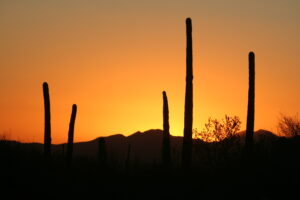The Beginnings of the West Coast Nonprofit Data Conference
The idea for the West Coast Nonprofit Data Conference (WCNDC) was the result of a conversation over beer in Tucson, AZ between Brint Milward, Helmut Anheier and Joe Galaskiewicz around 2002. Joe had recently moved to Arizona and Helmut to UCLA and were looking for some intellectual company. Joe had run a workshop in Minnesota where researchers doing nonprofit-related studies got together periodically to chat about their research, data, and trends in the field. Helmut had just relocated from the London School of Economics and run a similar workshop on data on philanthropy in Europe. The distance between schools is a little greater out here, but why not replicate the model that worked in Minnesota and London? No one ever associates the West Coast with nonprofits or voluntary action, but actually there were many scholars doing work on the sector west of the Rockies.
 The conversation led to the first WCNDC in the spring of 2004 hosted by the Center for Civil Society and the then School of Public Policy and Social Research at UCLA (now the Luskin School) and co-sponsored by the Udall Center for Studies in Public Policy at the University of Arizona. Zeke Hasenfeld, Steve Smith, Robert Ashcraft, Kirsten Gronbjerg, Brint Milward, and Laura Deitrick were all early supporters and participants. We had 49 attendees from a variety of institutions, mostly in California and Arizona. It did not cost very much (just breakfast and lunch on Saturday) and people paid their own airfare and hotel and Friday night dinner.
The conversation led to the first WCNDC in the spring of 2004 hosted by the Center for Civil Society and the then School of Public Policy and Social Research at UCLA (now the Luskin School) and co-sponsored by the Udall Center for Studies in Public Policy at the University of Arizona. Zeke Hasenfeld, Steve Smith, Robert Ashcraft, Kirsten Gronbjerg, Brint Milward, and Laura Deitrick were all early supporters and participants. We had 49 attendees from a variety of institutions, mostly in California and Arizona. It did not cost very much (just breakfast and lunch on Saturday) and people paid their own airfare and hotel and Friday night dinner.
We subsequently had meetings in several venues and are very grateful to the local hosts who assumed responsibility (and the cost) for the meeting at their institution. Without their support the WCNDC would have died long ago.
The purpose of the conference originally – and still today – was to provide a forum where faculty, grad students, and applied researchers could come together and talk about data and methods. Even at the first conference there was a special section on methodology. Theory is important, but the main thrust was to inform one another of data sources throughout the West, what people were doing, about new methods for analysis, and the emergent standards within the field.
Often hosts would have people from local government agencies or foundations come by and talk about data, problems, and how to access it. This not only taught us what was (and wasn’t) available, but it also made us aware how different the states were. Most of our early attendees came from California and Arizona. Then we got Washington and Oregon involved and more recently people from Nevada, Utah, Colorado, and Texas. As more states were brought on board, the variation across states became even more apparent, and it was clear that out West nonprofits, philanthropy, and voluntary action come in a variety of forms.

As time went on, grad students found the conference especially useful. This is because there are not many people doing work on nonprofits in traditional academic departments, and they feel lonely. It also gave them a chance to bounce ideas off of experienced researchers, make a presentation, and maybe find someone who could write a letter of recommendation or even co-author. Given the big presence of grad students, hosts expanded the program to include sessions on ‘nascent research projects.’ The informal feedback to students was invaluable, and we hope this tradition will continue.
Reflections on Nonprofit Sector Research
Reflections on Nonprofit Sector Policy
Joseph Galaskiewicz and Helmut Anheier
April 2013
Berkeley, CA